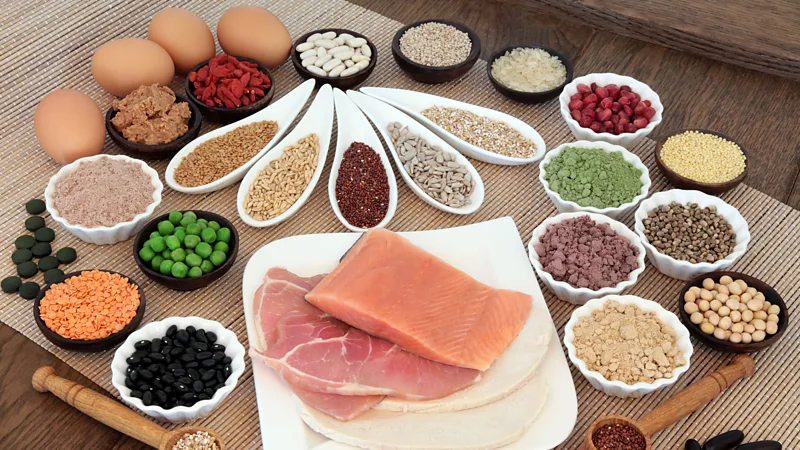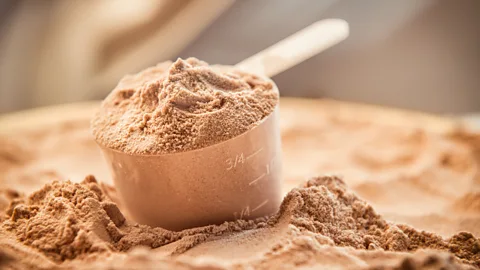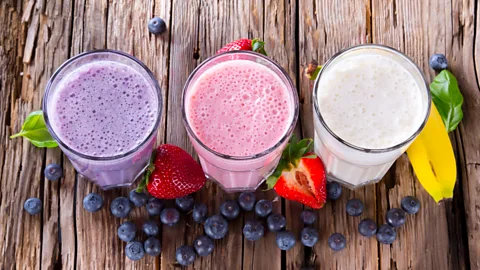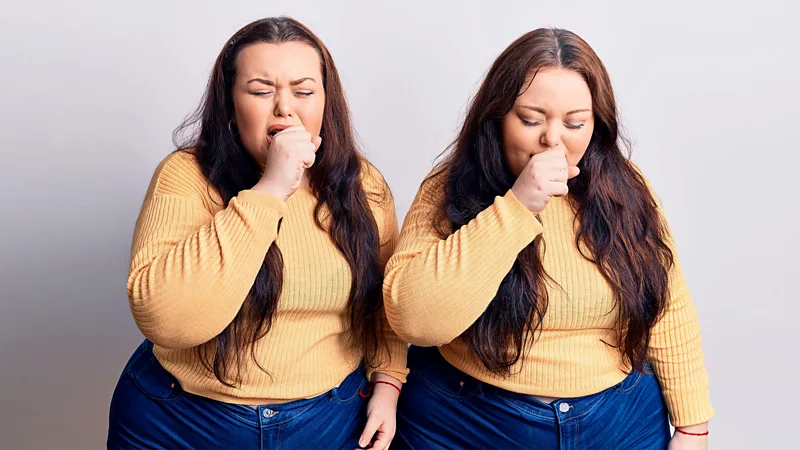How much protein is too much?

We’re led to believe the more protein the better when it comes to building muscle and losing weight. But are protein supplements, bars, and shakes helping or backfiring?
In the early 20th Century, Arctic explorer Vilhjalmur Stefansson spent a collective five years eating just meat. This meant that his diet consisted of around 80% fat and 20% protein. Twenty years later, he did the same as part of a year-long experiment at New York City's Bellevue Hospital in 1928.
Stefansson wanted to disprove those who argued that humans cannot survive if they only eat meat. But unfortunately for him, in both settings he very quickly became ill when he was eating lean meats without any fat. He developed "protein poisoning", nicknamed "rabbit starvation". His symptoms disappeared after he lowered his protein intake and he raised his fat intake. In fact, after returning to New York City and to a typical US diet with more normal levels of protein, he reportedly found his health deteriorating and returned to a low-carb, high fat, and high protein diet until his death aged 83.
His early experiments are some of the few recorded cases of high protein intake having extreme adverse effects – but despite soaring sales of protein supplements, many of us are still unsure how much protein we need, how best to consume it, and if too much, or too little, is dangerous.
Despite obesity rates doubling over the past two decades, we're becoming increasingly conscious of what we're eating. In recent years many of us have swapped white bread for brown and wholemeal bread and full-fat milk for skimmed. Taking centre stage in our health kick is protein, with protein balls, bars and enhanced protein versions of staple products, from cereals to soup, dominating supermarket shelves. And with the global protein supplements market valued at $22.43bn (£17.75bn) in 2021, it's clear we're buying into the idea that we need as much protein as possible.
But some experts now argue that foods with inflated protein (and prices) are a waste of money.
 Supplement brands advise drinking protein shakes after a workout to help the growth and repair of muscle tissue (Credit: Getty Images)
Supplement brands advise drinking protein shakes after a workout to help the growth and repair of muscle tissue (Credit: Getty Images)How much protein do you need to build muscle?
Protein is essential for the body to grow and repair. Protein-rich food such as dairy, meat, eggs, fish and beans are broken down into amino acids in the stomach and absorbed in the small intestine, then the liver sorts out which amino acids the body needs. The rest is flushed out in our urine.
So, how much protein should you eat each day? Adults who aren't especially active are advised to eat roughly 0.75g (0.03oz) of protein per day for each kilogram they weigh. On average, this is 55g (1.9oz) for men and 45g (1.6oz) for women – or two palm-sized portions of meat, fish, tofu, nuts or pulses.
Not getting enough protein can lead to hair loss, skin breakouts and weight loss as muscle mass decreases. But these side effects are very rare, and largely only occur in those with eating disorders.
Despite that, most of us have long associated protein with building muscle. This is accurate. Strength-based exercise causes a breakdown of protein in the muscle. For muscles to grow stronger, the proteins need to rebuild. A type of amino acid called leucine plays a particularly big part in triggering protein synthesis.
Some experts even argue that not consuming protein post-workout could cause the breakdown of muscle to be higher than the synthesis – meaning there’s no net gain in muscle mass. Supplement brands advise drinking protein shakes after a workout to help the growth and repair of muscle tissue, usually in the form of leucine-rich whey protein, a by-product of making cheese.
 Many people consume sport nutrition products such as protein bars and shakes (Credit: Getty Images)
Many people consume sport nutrition products such as protein bars and shakes (Credit: Getty Images)One survey of 2,000 Brits found that, in 2022 people spent, on average, £200 per month on maintaining their health and fitness, and around £14 of this was spent on protein supplements - half the amount they spent on 'healthy' groceries. But a 2017 Mintel survey found that more than half of those who use protein bars and shakes find it difficult to tell if they have any effects.
A 2022 analysis of research concluded that there was a relationship between healthy adults who consumed protein powder and gains in both lean body mass and in lower body strength. However, there isn't strong evidence that it makes a difference to other tests of strength, such as handgrip. Another review published the same year found that protein supplements don't seem to help with sore muscles after a workout.
But even if athletes and gym goers may benefit from a post-workout protein boost, that doesn't mean they should reach for the supplements and smoothies. Most people get more than their daily recommended allowance from food, says Kevin Tipton, a sport professor of the University of Stirling. "There's no need for anyone to have supplements. They're a convenient way to get protein, but there's nothing in supplements you can’t get in food. Protein bars are really just candy bars with a bit of extra protein."
Tipton adds that even among bodybuilders, products like whey protein aren't as critical as they are hyped up to be. "There's too much focus on which supplements to take, as opposed to getting in the gym and working harder. There are so many other variables, such as sleep, stress and diet," he says.
Who can benefit from extra protein?
Most experts agree with Tipton that protein is best consumed in food instead of supplements. But there are some exceptions, such as athletes who find it difficult to hit their daily protein targets, points out Graeme Close, professor of human physiology at Liverpool John Moores University. "I believe most need more than the recommended daily allowance, and there's good evidence to support this," he says. In this case, he says, a shake can be useful.
Another demographic who can benefit from extra protein? The elderly. That's because as we age, we need more protein to retain muscle mass. But we also tend to eat less protein as we get older because our taste-buds begin to prefer sweet over savoury.
Emma Stevenson, professor of sport and exercise science at Newcastle University, is working with food companies to get more protein into snacks that the elderly are known to regularly buy, such as biscuits. "We need to maintain our muscle mass as we age, because we become less active and frail," she says.
Close says the elderly should increase protein intake to around 1.2g per kg body weight.

Can eating more protein help you lose weight?
Protein has long been linked to weight loss, with low-carb, high-protein diets such as Paleo and Atkins promising to prolong the feeling of fullness. People fail to lose weight often because they feel hungry, and MRI studies have shown that a high-protein breakfast can help stop cravings later in the day.
There is sufficient evidence that protein is satiating, says Alex Johnstone of the University of Aberdeen. If you're trying to lose weight, it's therefore more important to have a high-protein breakfast, such as beans on toast or a dairy smoothie, rather than to have supplements.
But she doesn't advocate "Atkins-type" diets and has found that cutting out carbohydrates has adverse effects on gut health (and we now know that maintaining a healthy gut is crucial to many aspects of our health and well-being).
 Protein balls are often high in calories and can contain huge amounts of carbs (Credit: Getty Images)
Protein balls are often high in calories and can contain huge amounts of carbs (Credit: Getty Images)Instead, Johnstone recommends that overweight people eat a high-protein and moderate-carb diet, consisting of 30% protein, 40% carbs and 30% fat – compared to the average diet of around 15% protein, 55% carbs and 30% fat.
But, of course, upping protein intake alone won’t help you lose weight. Choosing lean meat such as chicken or fish is key. Studies also show that eating large amounts of animal protein is linked to weight gain and red meat in particular is linked to an increased risk of cancer as well as heart disease.
There are, though, healthy proteins which are not meat, such as mycoprotein, which is derived from fungi. Quorn, for example, contains this type of protein, and is high in fibre too.
Researchers now are looking into how this unique composition (of both protein and fibre) can affect satiety and insulin levels, which are linked to type two diabetes. One team compared a mycoprotein diet to a chicken diet and found that the insulin levels in those who ate quorn achieved the same sugar control, but needed less insulin to be produced by the pancreas.
And in 2020, researchers put 20 healthy volunteers on a week-long diet where their lunch and evening meals contained either meat/fish or mycoprotein as their main source of protein, and monitored their bodies' responses. They found that the mycoprotein diet led to changes in their blood associated with lower risk of heart attack, stroke and diabetes.
Recent research suggests that getting our protein from dairy, as well as plants, may be the most beneficial for our health in the long run. A 2024 study analysing the health data of more than 48,000 female NHS nurses found that protein intake was strongly linked to healthy aging. This is defined in the study as not having any of 11 major chronic diseases - including cancer or diabetes – or memory or physical impairment, and having good mental health. But the researchers concluded that the type of protein the nurses ate was crucial. Eating animal protein was associated with several chronic diseases, while dairy and plant protein was linked with a lower risk, and mental health status later in life. But the mechanisms behind these relationships, the researchers say, are complicated – and not yet fully understood.
Is too much protein bad?
Fortunately, it's difficult to have too much protein. While we do have an upper limit of protein intake, it's "virtually impossible" to reach, says Tipton. "There are concerns among some dieticians that a high protein diet can hurt the kidneys and bones, but evidence in otherwise healthy people is minimal. It is possible there could be a problem if someone with an underlying kidney [issue] eats high amounts of protein, but the odds of any adverse effects are very low."
But while protein itself isn't harmful, many protein supplements are high in carbohydrates called Fodmaps that trigger digestive symptoms like bloating, gas and stomach pain. Stevenson advises reading labels carefully on supplements, bars and balls. "Often, they're very high in calories and contain huge amounts of carbs, often in form of sugar. You shouldn't necessarily think that because it says it’s high protein that it's healthy," she says.
The risk of consuming too much protein is small, but the bigger risk might just be falling for overpriced products offering us more protein than we need. "Some products labelled as high protein aren't, and they're quite expensive. Anyway, consuming more protein than needed is wasteful in terms of money, and it’s paid down the toilet," says Johnstone.
*This article was originally published on 8 May 2020. It was updated on 23 February 2024 to include recent research.
Since the initial publication of this article, Kevin Tinton has sadly passed away. We have, however, left his comments in place.
Source: BBC

























































